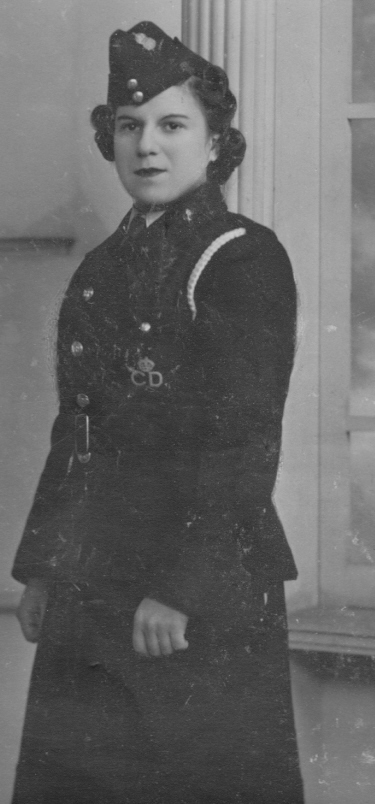|
Louisa Frumkin in her own words
Around 1940 I volunteered to work as a part-time Civil Defence Fire Warden.
I became the Senior Fire Guard of our area post A5, within Stoke Newington. Every business premises needed to appoint a Fire Guard, and they were supposed to report to me. In practice, these guards were generally older men, all volunteers, and I and a companion used to go round to see them on duty.
One of the roles of the fire wardens was to learn where all the fire hydrants were, so that we could inform the Fire Service if needed. Our main duty was to patrol the streets of our area on foot. There were always at least two of us together we weren't allowed to patrol alone. If any incident occurred, we had to inform the fire or ambulance service as appropriate as to what help was needed, and lead the rescue services to the site. Another rescue service that played an important role were the teams that would dig through the debris to rescue people trapped if, for example, a building had collapsed. We didn't have radios there was just the telephone at the fire warden's post - so we had to go on foot to pass our information on. If an incident happened, we would run back to the warden's post mine was a basement room in a house and call the rescue services from there.

Our area was fairly lucky, certainly in regard to the fire-bombing of the earlier part of the war. I can't recall many incidents during my time of patrolling, although I do particularly remember one night when a lot of fire bombs were dropped. But across the road from our house was Finsbury Park, which was a constant target for German bombing because anti-aircraft artillery batteries were positioned there, and tanks were being repaired at a nearby race track.
There was also a large underground station near our house. One of my routine tasks every evening was to register the number of people who wanted to spend the night in the station. But one night, a German bomb penetrated the midst of the station and many people were killed.
As for our house in Seven Sisters Road, it was subject to both the shock waves caused by the artillery fire from Finsbury Park and the bombing by German aircraft. The Army Authorities therefore suggested that the house be reinforced with concrete. Because of this, our friends and neighbours considered the house very safe. Accordingly, when the bombs were falling, lots of people would come to sleep in our basement shelter and one even slept under our dining room table. We got fed up with this and took our chances sleeping upstairs.
Once the Germans started dropping the V-1 flying bombs in 1944, I switched to full-time fire warden duties, and was the Deputy Post Warden. I find it hard to remember the duties involved, but I think I was based rather more than before in the warden's post, taking and acting on the phone calls. It was in the warden's post that I learned to play table tennis!
The V-2 rocket attacks began late in 1944. They flew faster than the speed of sound, which meant that, unlike with the V-1's, there was no whistle warning enabling us to take cover the whistle could only be heard after the rocket had landed. We weren't allowed to patrol once the V-2s started being fired. The V-2s caused much loss of life and damage to property. One of them fell near the home of my sister Rosie and her husband Wilfred Goldberg, and several of their neighbours were killed. Their daughter Angela, who was then 2 years old, was in the house at the time and was miraculously saved by the fact that she was sleeping in an iron cot, which prevented the roof beams from falling on top of her. I had that day gone down to Bournemouth with my mother, my first trip away for some years, and was there for one night and heard about this incident. I came back to London that day and brought Rosie and Angela back down to Bournemouth.
The war in Europe ended on May 8, 1945, VE Day, and my brother Aaron and I went to Trafalgar Square to join the thousands of others in wild celebrations. In all I had served in Civil Defence for around 5 years and was awarded the Defence Medal, as were all others who had served a similar period.
|